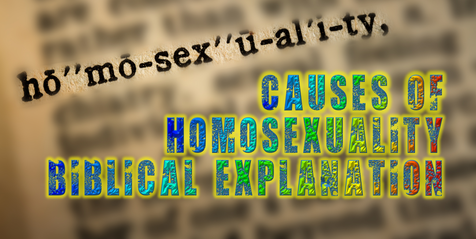Homosexuality
The causes of homosexuality are attributable to man's sinful nature, nurture and environment, and personal choice. How important each factor is, though, is an issue that is debated. Those from the most liberal school usually assume a philosophy of determinism, treating homosexuality as an identity or orientation which one has no choice over, and which cannot be changed. This belief is then used to justify acting it out. The contrasting and warranted position is that homosexuality is a choice, that of yielding to ultimately harmful desires, and which choice is partly affected by nurture and environment. As with all choices, faith can overcome unwanted desire.
Causes of homosexuality - Biblical explanation
The Bible, being the most comprehensive transcendent moral authority, abundantly deals with human nature and behavior and consistently manifests that the nature of man has not changed since the Fall. So the Bible is certainly the preeminent authoritative source when it comes to providing a framework when determining the causes of homosexuality. Man is shown to have been created as a perfectly made being (Gen. 1:31) - yet not as a robot - but as a being designed to be able to make choices, which thereby allowed him to distort his perfection. God from the beginning also joined male and female in lifelong marriage, and placed a priority on the family, and provided laws, as needed, for its health and preservation and that of society, while aberrations result from failure to abide by them. For more information please see: Homosexuality and the Bible and Homosexuality and biblical interpretation
Nature of man and causes of homosexuality
In the beginning, man disobeyed his Creator, and as part of the punishment for so doing both mankind and that which he was given stewardship of was negatively affected. In addition to physical decay and the suffering and natural death of living creatures being introduced into the world, (Gen. 2:17; 3:17-19; Rom. 5:12,17; 6:23) the Fall resulted in the nature of man demonstrating a certain proclivity to sin. However, this does not determine that a man must practice a certain sin, nor does it justify man giving into this attraction to sin, as God also gave man ability to resist sin. (Gen. 4:7)
Certain negative physical effects of sin are also seen as being progressive, as with time more diseases and other aberrations seemed to have occurred, and laws against incest later became necessary. In addition, as men continued to act contrary to the basic moral laws which they knew innately and through creation, conscience and oral tradition, a formal body of law was given through Moses, which detailed and codified the immutable morality God enjoins upon man. (Ex. 20; Deut. 4:8-9; Lev. 18; Gal. 3:19) Addition laws include ceremonial laws which the New Testament reveals were typological. For more information please see: Lev. 18.
As regards homosexuality, from the beginning of the Bible and throughout, it consistently teaches that God only sexually joined opposite genders together, sanctifying them in marriage, having created men and women uniquely compatible and complementary. (Gen. 2:18-24; Mt. 19:4; 1 Cor. 11:8-12)
In contrast to what God had ordained by design and decree, homosexuality is one of many sins which are a result of man yielding to his sinful nature, and is a form of fornication, although a most perverse kind. The prohibition of it is given along with sexual relations with animals, (Lev. 18:23) and is clearly condemned wherever it is manifestly dealt with. (Lev. 18:22; 20:13; Mk. 7:21; Rom. 1:20-27; 1 Cor. 6:9; 1 Tim. 1:10)
The Bible, as well as history, also evidences that while there are three areas in which man sins, those of lust for pleasure, possessions and power, (1 Jn. 2:16) individuals may differ as regards which type of sins present the greatest temptation for them, with genetics playing at least a part in that. That judgment upon a people who gave into a specific sin could result in a genetic predisposition to that same sin among their offspring may be speculated, but it is not proven.
Environment
The Bible provides a clear link between the adherence of a family or a nation to the laws of God and the moral choices of offspring. (Prov. 22:6) The Bible also positively examples close father-son and familial relationships, and may be seen to partially implicate detachment with rebellion. (Gen. 37–50; 2 Sam. 13-18) Studies today have shown that religious upbringing and culture can strongly affect rates of homosexuality.
The record of Sodom, as well as accounts of nations elsewhere, testify that living within the environment of people where iniquity abounds is conducive to furthering the same iniquity among succeeding generations, resulting in the necessity of Divine judgment when nations became given over to such. (Lev. 18:24; 20:22; Deut. 18:12; 28; Jer. 14:9-10; Rom. 2:2)
In Gen. 19, the city of Sodom is revealed as a place in which men sexually lusted after men, from which the term "sodomy" was derived (like as homosexuals use the term "gay", although this is contradictory in the end), and Jude 7 refers to Sodom and its region being given to fornication, including that of unnatural relations.
In Ezekiel 16:49 the general iniquity of Sodom and its "sisters" is given as "pride, fulness of bread, and abundance of idleness" and general indifference to the needy. The next verse proceeds to inform that "the Sodomites were haughty, and committed abomination before me: therefore I took them away as I saw good." The word for abomination here is tô‛êbah, which is not the word often used for ritual uncleanness, but is often used for sexual sin, in particular sexual sins and including sodomy. (Lev.18:22; 26–27,29,30; 20:13; Deut. 23:18; 24:4 1 Kings 14:24; Ezek. 22:11; 33:26) Sodom is also associated more with sexual sins than with any other physical type of sin.
What the Bible, as well as secular history, reveals is that prevalent homosexuality is concomitant with pride, affluence, increased free time, and selfish indulgence and carelessness. Therefore, rebellion against God's laws and order and the resultant environmental factors are seen to be a cause in promoting sensuality and homosexuality.
Idolatry and judgment
In Romans 1, God, through the apostle Paul, condemns both male and female homoeroticism, which, as a cultural practice, is shown to be a manifestation and a result of idolatry, in which man progressively acted contrary to that which God has revealed by creation, by design and normality. This is morality which is confirmed by written decree (the Law), as the next chapter declares. As a result of this continued rebellion, which was partly manifest in God being reduced to an image like unto corruptible creatures (like as today with homosexuals construing Christ to be homosexual, or sanctioning it, as well as nature effectively being worshiped), "God gave them up to uncleanness through the lusts of their own hearts, to dishonour their own bodies between themselves." (Rom. 1:24)
It is also stated that a certain afflictive punishment(s) of the body were incurred by those men who engaged in relations with each other. (Rom. 1:27) Unless repentance takes place, worse consequences will follow. (Rev. 21:28)
While some seek to render this chapter as only condemning homosexual relations when done as part of idolatry, the condemnation is not due to its association with paganism, rather as it inherently contrary to that which God ordained, then it is a manifestation of false religion, regardless of its form, though in ancient times in which religion was an inseparable part of culture, then formal idolatry was what was more manifested. Romans 1 proceeds to show that homosexuality is not alone as a fruit of idolatry, but that this particular pernicious physical sin is one of many inherently evil things. (Rom. 1:28-32) For more information please see: Romans 1.
In summary, God's eternal power is manifest in His creation (Romans 1:18-20). Nonetheless, certain people chose to worship the creature more than the Creator (Romans 1:21-25). Therefore, God gave them up to homosexuality and other sins and gave them over to a reprobate mind (Romans 1:26-32). As an example of the truth of this teaching, feminists, wishing to deny the God-given role of women, often engage in goddess worship and other forms of idolatry and as a consequence are often given up to lesbianism.
Conclusion of Biblical explanation
What is revealed in the Bible is that homosexuality is a practice due to man yielding to his sinful nature and disobeying the good laws of God, and misusing, among other things, his sexual abilities. This disobedience itself is idolatry (whatever holds your chief allegiance is your god, at least at that time), while continued idolatry results in homosexuality as a practice, as God delivers one over to perverse desires. In addition, individual and societal disobedience to the laws of God creates an environment which is conducive to perpetuating and further intensifying iniquity, which if continued, in time requires judgment.
Causes of homosexuality - Biblical explanation
The Bible, being the most comprehensive transcendent moral authority, abundantly deals with human nature and behavior and consistently manifests that the nature of man has not changed since the Fall. So the Bible is certainly the preeminent authoritative source when it comes to providing a framework when determining the causes of homosexuality. Man is shown to have been created as a perfectly made being (Gen. 1:31) - yet not as a robot - but as a being designed to be able to make choices, which thereby allowed him to distort his perfection. God from the beginning also joined male and female in lifelong marriage, and placed a priority on the family, and provided laws, as needed, for its health and preservation and that of society, while aberrations result from failure to abide by them. For more information please see: Homosexuality and the Bible and Homosexuality and biblical interpretation
Nature of man and causes of homosexuality
In the beginning, man disobeyed his Creator, and as part of the punishment for so doing both mankind and that which he was given stewardship of was negatively affected. In addition to physical decay and the suffering and natural death of living creatures being introduced into the world, (Gen. 2:17; 3:17-19; Rom. 5:12,17; 6:23) the Fall resulted in the nature of man demonstrating a certain proclivity to sin. However, this does not determine that a man must practice a certain sin, nor does it justify man giving into this attraction to sin, as God also gave man ability to resist sin. (Gen. 4:7)
Certain negative physical effects of sin are also seen as being progressive, as with time more diseases and other aberrations seemed to have occurred, and laws against incest later became necessary. In addition, as men continued to act contrary to the basic moral laws which they knew innately and through creation, conscience and oral tradition, a formal body of law was given through Moses, which detailed and codified the immutable morality God enjoins upon man. (Ex. 20; Deut. 4:8-9; Lev. 18; Gal. 3:19) Addition laws include ceremonial laws which the New Testament reveals were typological. For more information please see: Lev. 18.
As regards homosexuality, from the beginning of the Bible and throughout, it consistently teaches that God only sexually joined opposite genders together, sanctifying them in marriage, having created men and women uniquely compatible and complementary. (Gen. 2:18-24; Mt. 19:4; 1 Cor. 11:8-12)
In contrast to what God had ordained by design and decree, homosexuality is one of many sins which are a result of man yielding to his sinful nature, and is a form of fornication, although a most perverse kind. The prohibition of it is given along with sexual relations with animals, (Lev. 18:23) and is clearly condemned wherever it is manifestly dealt with. (Lev. 18:22; 20:13; Mk. 7:21; Rom. 1:20-27; 1 Cor. 6:9; 1 Tim. 1:10)
The Bible, as well as history, also evidences that while there are three areas in which man sins, those of lust for pleasure, possessions and power, (1 Jn. 2:16) individuals may differ as regards which type of sins present the greatest temptation for them, with genetics playing at least a part in that. That judgment upon a people who gave into a specific sin could result in a genetic predisposition to that same sin among their offspring may be speculated, but it is not proven.
Environment
The Bible provides a clear link between the adherence of a family or a nation to the laws of God and the moral choices of offspring. (Prov. 22:6) The Bible also positively examples close father-son and familial relationships, and may be seen to partially implicate detachment with rebellion. (Gen. 37–50; 2 Sam. 13-18) Studies today have shown that religious upbringing and culture can strongly affect rates of homosexuality.
The record of Sodom, as well as accounts of nations elsewhere, testify that living within the environment of people where iniquity abounds is conducive to furthering the same iniquity among succeeding generations, resulting in the necessity of Divine judgment when nations became given over to such. (Lev. 18:24; 20:22; Deut. 18:12; 28; Jer. 14:9-10; Rom. 2:2)
In Gen. 19, the city of Sodom is revealed as a place in which men sexually lusted after men, from which the term "sodomy" was derived (like as homosexuals use the term "gay", although this is contradictory in the end), and Jude 7 refers to Sodom and its region being given to fornication, including that of unnatural relations.
In Ezekiel 16:49 the general iniquity of Sodom and its "sisters" is given as "pride, fulness of bread, and abundance of idleness" and general indifference to the needy. The next verse proceeds to inform that "the Sodomites were haughty, and committed abomination before me: therefore I took them away as I saw good." The word for abomination here is tô‛êbah, which is not the word often used for ritual uncleanness, but is often used for sexual sin, in particular sexual sins and including sodomy. (Lev.18:22; 26–27,29,30; 20:13; Deut. 23:18; 24:4 1 Kings 14:24; Ezek. 22:11; 33:26) Sodom is also associated more with sexual sins than with any other physical type of sin.
What the Bible, as well as secular history, reveals is that prevalent homosexuality is concomitant with pride, affluence, increased free time, and selfish indulgence and carelessness. Therefore, rebellion against God's laws and order and the resultant environmental factors are seen to be a cause in promoting sensuality and homosexuality.
Idolatry and judgment
In Romans 1, God, through the apostle Paul, condemns both male and female homoeroticism, which, as a cultural practice, is shown to be a manifestation and a result of idolatry, in which man progressively acted contrary to that which God has revealed by creation, by design and normality. This is morality which is confirmed by written decree (the Law), as the next chapter declares. As a result of this continued rebellion, which was partly manifest in God being reduced to an image like unto corruptible creatures (like as today with homosexuals construing Christ to be homosexual, or sanctioning it, as well as nature effectively being worshiped), "God gave them up to uncleanness through the lusts of their own hearts, to dishonour their own bodies between themselves." (Rom. 1:24)
It is also stated that a certain afflictive punishment(s) of the body were incurred by those men who engaged in relations with each other. (Rom. 1:27) Unless repentance takes place, worse consequences will follow. (Rev. 21:28)
While some seek to render this chapter as only condemning homosexual relations when done as part of idolatry, the condemnation is not due to its association with paganism, rather as it inherently contrary to that which God ordained, then it is a manifestation of false religion, regardless of its form, though in ancient times in which religion was an inseparable part of culture, then formal idolatry was what was more manifested. Romans 1 proceeds to show that homosexuality is not alone as a fruit of idolatry, but that this particular pernicious physical sin is one of many inherently evil things. (Rom. 1:28-32) For more information please see: Romans 1.
In summary, God's eternal power is manifest in His creation (Romans 1:18-20). Nonetheless, certain people chose to worship the creature more than the Creator (Romans 1:21-25). Therefore, God gave them up to homosexuality and other sins and gave them over to a reprobate mind (Romans 1:26-32). As an example of the truth of this teaching, feminists, wishing to deny the God-given role of women, often engage in goddess worship and other forms of idolatry and as a consequence are often given up to lesbianism.
Conclusion of Biblical explanation
What is revealed in the Bible is that homosexuality is a practice due to man yielding to his sinful nature and disobeying the good laws of God, and misusing, among other things, his sexual abilities. This disobedience itself is idolatry (whatever holds your chief allegiance is your god, at least at that time), while continued idolatry results in homosexuality as a practice, as God delivers one over to perverse desires. In addition, individual and societal disobedience to the laws of God creates an environment which is conducive to perpetuating and further intensifying iniquity, which if continued, in time requires judgment.





